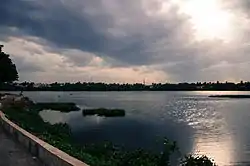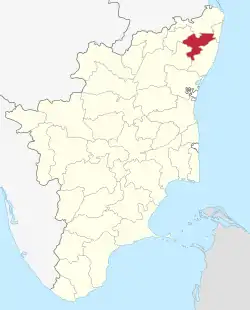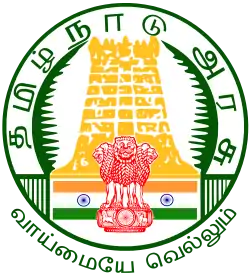Kanchipuram district
Kancheepuram district is one of the 38 districts (in the northeast) of the state of Tamil Nadu in India. The area comprising the present day Kancheepuram district was earlier a part of Chingleput district. The original Chingleput district was split in 1997 into form the present day Kancheepuram and Tiruvallur districts.[1]
Kancheepuram District | |
|---|---|
 Waters of Chembarambakkam Lake Chennai limit | |
 Location in Tamil Nadu, India | |
| Coordinates: 12.82°N 79.71°E | |
| Country | |
| State | |
| Established | 1 July 1997 |
| Founded by | M. Karunanidhi |
| Headquarters | Kancheepuram |
| Taluks | Kancheepuram, Sriperumbudur, Uthiramerur, Walajabad, Kundrathur |
| Government | |
| • District Collector | Mageswari Ravikumar I.A.S |
| Area | |
| • Total | 1,448 km2 (559 sq mi) |
| Population (2011) | |
| • Total | 1,441,829 |
| • Density | 1,000/km2 (2,600/sq mi) |
| Languages | |
| • Official | Tamil |
| Time zone | UTC+5:30 (IST) |
| PIN | 631 501 |
| Telephone code | 044 |
| ISO 3166 code | ? |
| Vehicle registration | TN-21, TN-87 |
| Coastline | 87.2 kilometres (54.2 mi) |
| Largest Metro | Kanchipuram |
| Sex ratio | M-50.6%/F-49.4% ♂/♀ |
| Literacy | 75.34% |
| Legislature type | elected |
| Legislature Strength | 3 |
| Lok Sabha constituency | Kancheepuram (SC), Sriperumbudur |
| Precipitation | 1,213 millimetres (47.8 in) |
| Avg. summer temperature | 36.6 °C (97.9 °F) |
| Avg. winter temperature | 19.8 °C (67.6 °F) |
| Website | kancheepuram |
On 18 July 2019, Chengalpattu district was carved out of Kanchipuram district, with suburbs from Chengalpet towards Chennai under the district headquarters in Chengalpet. The separation came into effect from 29 November which was done by Chief Minister Mr. Edappadi K Palaniswami.[2]
Geography
Kancheepuram district is situated on the North Eastern part of Tamil Nadu. It is bounded by Chengalpattu district in the East, Chennai district in the northeast, Ranipet and Tiruvannamalai districts in the west and Thiruvallur district in the north. It lies between 11° 00' to 12° 00' latitudes and 77° 28' to 78° 50' longitudes. The district has a total geographical area of 4,43,210 hectares.
The table below shows the maximum and minimum temperatures experienced in the district during different seasons.
| Summer | Winter | |
|---|---|---|
| Max. | 38.5 °C (101.3 °F) | 27.7 °C (81.9 °F) |
| Min. | 29.1 °C (84.4 °F) | 19.0 °C (66.2 °F) |
The pre-monsoon rainfall is almost uniform throughout the district. The coastal regions receive more rainfall than the interior ones. The district is mainly dependent on the monsoon rains. Failure of monsoon leads to distress condition. Northeast and Southwest monsoon are the major donors, with 54% and 36% contribution each to the total annual rainfall. During normal monsoon, the district receives a rainfall of 1200 mm.
The Palar river is the most important river running through the district. Through most of the year it remains dry, attributed to the construction of dams across the river in Andhra Pradesh. There are only a few hills of considerable elevation in the district. The southern part of Maduranthakam taluk contains small hills. The total forest area in the district is 23,586 hectares.
Climate
| Climate data for Chennai, India (Nungambakkam) 1981–2010, extremes 1901–2012 | |||||||||||||
|---|---|---|---|---|---|---|---|---|---|---|---|---|---|
| Month | Jan | Feb | Mar | Apr | May | Jun | Jul | Aug | Sep | Oct | Nov | Dec | Year |
| Record high °C (°F) | 34.4 (93.9) |
36.7 (98.1) |
40.6 (105.1) |
42.8 (109.0) |
45.0 (113.0) |
43.3 (109.9) |
41.1 (106.0) |
40.0 (104.0) |
38.9 (102.0) |
39.4 (102.9) |
35.4 (95.7) |
33.0 (91.4) |
45.0 (113.0) |
| Average high °C (°F) | 29.3 (84.7) |
30.9 (87.6) |
32.9 (91.2) |
34.5 (94.1) |
37.1 (98.8) |
37.0 (98.6) |
35.3 (95.5) |
34.7 (94.5) |
34.2 (93.6) |
32.1 (89.8) |
29.9 (85.8) |
28.9 (84.0) |
33.1 (91.6) |
| Daily mean °C (°F) | 25.2 (77.4) |
26.6 (79.9) |
28.7 (83.7) |
30.9 (87.6) |
32.9 (91.2) |
32.4 (90.3) |
30.9 (87.6) |
30.3 (86.5) |
29.8 (85.6) |
28.4 (83.1) |
26.5 (79.7) |
25.3 (77.5) |
29.0 (84.2) |
| Average low °C (°F) | 21.2 (70.2) |
22.2 (72.0) |
24.2 (75.6) |
26.6 (79.9) |
28.0 (82.4) |
27.5 (81.5) |
26.4 (79.5) |
25.9 (78.6) |
25.6 (78.1) |
24.6 (76.3) |
23.1 (73.6) |
21.9 (71.4) |
24.8 (76.6) |
| Record low °C (°F) | 13.9 (57.0) |
15.0 (59.0) |
16.7 (62.1) |
20.0 (68.0) |
21.1 (70.0) |
20.6 (69.1) |
21.0 (69.8) |
20.5 (68.9) |
20.6 (69.1) |
16.7 (62.1) |
15.0 (59.0) |
13.9 (57.0) |
13.9 (57.0) |
| Average rainfall mm (inches) | 25.9 (1.02) |
3.4 (0.13) |
3.5 (0.14) |
14.4 (0.57) |
34.2 (1.35) |
55.8 (2.20) |
103.8 (4.09) |
126.8 (4.99) |
147.7 (5.81) |
315.6 (12.43) |
399.9 (15.74) |
177.4 (6.98) |
1,382.9 (54.44) |
| Average rainy days | 1.4 | 0.8 | 0.3 | 0.8 | 1.8 | 4.0 | 6.5 | 7.7 | 7.3 | 10.9 | 11.5 | 5.8 | 58.8 |
| Average relative humidity (%) (at 17:30 IST) | 67 | 66 | 67 | 70 | 68 | 63 | 65 | 66 | 71 | 76 | 76 | 71 | 69 |
| Mean monthly sunshine hours | 232.5 | 240.1 | 291.4 | 294.0 | 300.7 | 234.0 | 142.6 | 189.1 | 195.0 | 257.3 | 261.0 | 210.8 | 2,848.5 |
| Mean daily sunshine hours | 7.5 | 8.5 | 9.4 | 9.8 | 9.7 | 7.8 | 4.6 | 6.1 | 6.5 | 8.3 | 8.7 | 6.8 | 7.8 |
| Source 1: India Meteorological Department (sun 1971–2000)[3][4][5][6] | |||||||||||||
| Source 2: Japan Meteorological Agency[7] | |||||||||||||
Administration structure
The district has various levels of local bodies for administration purposes.[8]
- Urban
- Municipality
- Kancheepuram - district headquarters
- Town panchayats
- Municipality
- Rural
- District panchayat wards - 9
- Panchayat union wards - 5
- Village panchayat wards - 274
Revenue divisions and taluks
Kancheepuram District consists of two revenue divisions and five taluks:[9]
- Sriperumbudur taluk
- Kunrathur taluk
- Kanchipuram taluk
- Walajabad taluk
- Uthiramerur taluk
Demographics
According to 2011 census, Kancheepuram district had a population of 3,998,252 with a sex-ratio of 986 females for every 1,000 males, much above the national average of 929.[10] A total of 431,574 were under the age of six, constituting 220,341 males and 211,233 females. Scheduled Castes and Scheduled Tribes accounted for 23.71% and 1.03% of the population respectively. The average literacy of the district was 75.37%, compared to the national average of 72.99%.[10] The district had a total of 1,006,245 households. There were a total of 1,673,814 workers, comprising 74,761 cultivators, 162,494 main agricultural labourers, 41,149 in house hold industries, 1,088,974 other workers, 306,436 marginal workers, 14,582 marginal cultivators, 110,020 marginal agricultural labourers, 13,583 marginal workers in household industries and 168,251 other marginal workers.[11]
| Year | Pop. | ±% p.a. |
|---|---|---|
| 1901 | 708,782 | — |
| 1911 | 759,794 | +0.70% |
| 1921 | 798,408 | +0.50% |
| 1931 | 871,546 | +0.88% |
| 1941 | 956,996 | +0.94% |
| 1951 | 1,030,559 | +0.74% |
| 1961 | 1,167,491 | +1.26% |
| 1971 | 1,499,744 | +2.54% |
| 1981 | 1,898,021 | +2.38% |
| 1991 | 2,415,010 | +2.44% |
| 2001 | 2,877,468 | +1.77% |
| 2011 | 3,998,252 | +3.34% |
| source:[12] | ||
Economy

Agriculture is the main occupation of the people with 47% of the population engaged in it. Paddy is the major crop cultivated in this district. Groundnuts, sugarcane, cereals, millet and pulses are the other major crops cultivated. 76.50 metric tonnes lands are cultivated in fuel wood and 8.039 tonnes in cashew. Palar river along with tanks and wells are the main sources of irrigation in this district.
More than 70 percent of the 163 notified areas (megalithic sites) in the state of Tamil Nadu are in Kancheepuram district, including those at Erumaiyur, Nandampakkam, Sirukalathur, Sikarayapuram, Ayyancheri, Kilambakkam and Nanmangalam.[13]
See also
References
- "History". Kancheepuram District. Retrieved 12 July 2020.
- "Palaniswami inaugurates Chengalpattu district". The Hindu. 30 November 2019.
- "Station: Chennai (Nungambakkam) Climatological Table 1981–2010" (PDF). Climatological Normals 1981–2010. India Meteorological Department. January 2015. pp. 185–186. Archived from the original (PDF) on 5 February 2020. Retrieved 2 March 2020.
- "Extremes of Temperature & Rainfall for Indian Stations (Up to 2012)" (PDF). India Meteorological Department. December 2016. p. M192. Archived from the original (PDF) on 5 February 2020. Retrieved 2 March 2020.
- "Table 3 Monthly mean duration of Sun Shine (hours) at different locations in India" (PDF). Daily Normals of Global & Diffuse Radiation (1971–2000). India Meteorological Department. December 2016. p. M-3. Archived from the original (PDF) on 5 February 2020. Retrieved 2 March 2020.
- "Chennai Climatological Table 1981–2010". India Meteorological Department. Retrieved 2 March 2020.
- "Normals Data". Japan Meteorological Agency. Retrieved 11 May 2020.
- "Local Body Ward Delimitation -2020 | Kancheepuram District,Government of Tamilnadu | City of Thousand Temples | India".
- "Tamil Nadu Government Portal". www.tn.gov.in. Retrieved 7 May 2020.
- "Census Info 2011 Final population totals". Office of The Registrar General and Census Commissioner, Ministry of Home Affairs, Government of India. 2013. Retrieved 26 January 2014.
- "Census Info 2011 Final population totals - Kancheepuram district". Office of The Registrar General and Census Commissioner, Ministry of Home Affairs, Government of India. 2013. Retrieved 26 January 2014.
- Decadal Variation In Population Since 1901
- Madhavan, D. (20 December 2012). "National Institute of Siddha modifies expansion plan". The Hindu. Chennai. Retrieved 23 December 2012.
